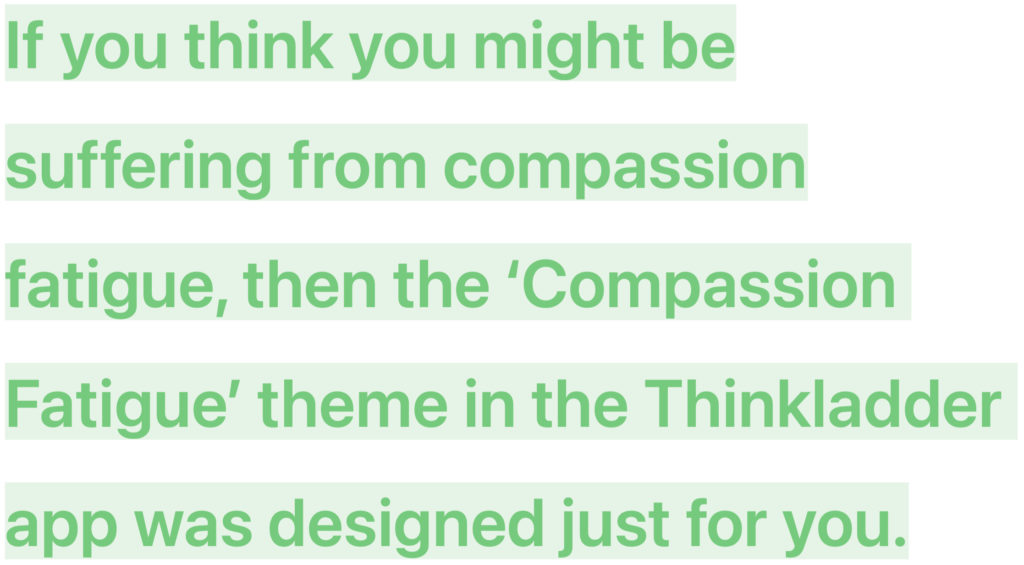Try out the Compassion Fatigue Theme in the Thinkladder app here:
Caring for others is a beautiful part of being human. Sometimes, however, we can care so much that we disregard our own needs, leaving us burnt out and depleted. We might feel detached, grumpy, numb, depressed, anxious or powerless. If we find these negative emotions displacing our normal empathy, then we may be dealing with compassion fatigue.
Identifying the factors that led to compassion fatigue is part of how we heal. We all have limiting beliefs that may hurt us or hinder our recovery. Beliefs about caring for others could be something like ‘I should always help people, even when I don’t feel like it,’ or ‘Because I’ve always helped people, I have to keep helping them.’
Once we’ve discovered our beliefs, we then have the power to challenge and change them. We can create a healthier, more sustainable approach to caring. If this is something you can relate to, then the ‘Compassion Fatigue’ theme in the Thinkladder app was designed just for you.
Insights from the “Compassion Fatigue” Theme
I can provide much more benefit to the world long term if I maintain my health and well-being, and step back to re-evaluate every time helping starts to feel like a chore.
Tips for kicking compassion fatigue to the curb:
Set boundaries: If you find it hard to support others without losing sight of your own needs, setting boundaries will help you find balance. If you work in an industry that taxes your emotional resources, it may involve limiting your work hours or declining certain tasks. If you’re experiencing compassion fatigue in a personal relationship, consider communicating directly and honestly with the individual to establish healthy boundaries.
Reflect: Retrace your steps. Why did you choose to be supportive of others in the first place? Although you may need to focus on filling your own cup right now, reflecting on your initial motivations can reignite your sense of purpose and passion. By taking care of yourself and seeking support when needed, you can manage compassion fatigue and continue to make a positive impact in the lives of others.
Don’t forget the basics:
Prioritise your needs: Remember to take care of yourself by fulfilling your human needs, like eating well, getting enough sleep, exercising, practising mindfulness, socialising, and doing activities that make you happy. Balancing all these aspects of life can be challenging, but you can make it easier by establishing a regular self-assessment routine. During this time, evaluate your physical, mental, and emotional needs and make any necessary adjustments to your plans.
Seek support: Speak to someone you trust to lift a little of the weight off your shoulders. You may also consider speaking to a therapist who can equip you with tools to navigate this experience.
Challenge limiting beliefs: It’s common to fall into the compassion fatigue trap due to unhelpful beliefs, like thinking it’s our moral obligation to help those in need. Thinkladder can assist you in identifying these beliefs, challenging them, and discovering new insights to motivate and empower you on your journey.
Related topics: People Pleasing, Self-Worth, Anxiety & Comparing Myself To Others.


